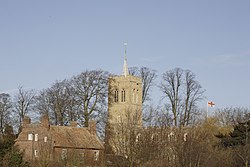Great Gransden
| Great Gransden | |
|---|---|
 Great Gransden Postmill |
|
 Church, Great Gransden, Cambridgeshire |
|
| Great Gransden shown within Cambridgeshire | |
| Population | 1,023 (2011 Census) |
| OS grid reference | TL276556 |
| District | |
| Shire county | |
| Region | |
| Country | England |
| Sovereign state | United Kingdom |
| Post town | SANDY |
| Postcode district | SG19 |
| Dialling code | 01767 |
| EU Parliament | East of England |
Great Gransden is a civil parish and village in the Huntingdonshire district of Cambridgeshire, England. In 2001, the population of the parish was 969 people, increasing to 1,023 at the 2011 Census. It is 11 miles (18 km) west of Cambridge. It is notable for the oldest post mill in England.
The village's name is derived from 'valley of a man named Granta or Grante'. It was spelled Grantandene in 973 and Grante(s)dene in the 1086 Domesday book. Great Gransden was mentioned in 973 when its land was endowed to Thorney Abbey by Aethelwold, Bishop of Winchester. The village consisted of 33 households in 1086, and the annual rent paid to the lord of the manor was £30.
Great Gransden's older centre is made up of cottages grouped around the 16th century church, although its tower dates from about 1390. The continuing connection between the village and Clare College, Cambridge appears to date back to 1346, when the advowson for Great Gransden church was part of the original endowment of the college.
Barnabas Oley was first instituted to the vicarage in 1633. He was a Fellow of Clare College and editor of George Herbert's works. During the English Civil War, he was one of the university's most active Royalists. He was expelled from his fellowship and lodgings in 1644, but in 1660 they were restored to him. From 1664 he lived mainly at Great Gransden and left many benefactions. He founded the village school in 1670 and it is named after him. His life is celebrated every year on the school's Founder's Day, held in the parish church. Children leaving the school are presented with an 'Oley Bible' by a Fellow of Clare College.
As a civil parish, Great Gransden has a parish council. The parish council is elected by the residents of the parish who have registered on the electoral roll; the parish council is the lowest tier of government in England. A parish council is responsible for providing and maintaining a variety of local services including allotments and a cemetery; grass cutting and tree planting within public open spaces such as a village green or playing fields. The parish council reviews all planning applications that might affect the parish and makes recommendations to Huntingdonshire District Council, which is the local planning authority for the parish. The parish council also represents the views of the parish on issues such as local transport, policing and the environment. The parish council raises its own tax to pay for these services, known as the parish precept, which is collected as part of the Council Tax. The parish council has nine councillors and the parish council normally meets on the first Monday of the month in the Reading Room in Great Gransden.
...
Wikipedia

